Chapter 1|| Chapter 2 || Chapter 3 || Chapter 4|| Chapter 5 || Chapter 6 || Chapter 7 || Chapter 8 || Chapter 9 || Chapter 10 || Chapter 11 || Chapter 12 || Chapter 13 || Chapter 14 || Chapter 15 || Chapter 16 || Chapter 17 || Chapter 18 ||
Shrimad Bhagwad Gita – Chapter – 14 (Complete)
Chapter – 14 – Shloka -1
The blessed Lord spoke:
Now Arjuna, I shall expose to you the most supreme and highest of all the wisdom in this universe by which all the great sages in this universe have achieved the highest perfection.
श्रीभगवान् बोले —-ज्ञानों में भी अति उत्तम उस परम ज्ञान को मैं फिर कहूँगा, जिसको जानकर सब मुनि जन इस संसार से मुक्त्त होकर परम सिद्भि को प्राप्त हो गये हैं ।। १ ।।
Chapter – 14 – Shloka -2
By fully learning, understanding and practising this wisdom, these sages have become a part of Me. As a result, they are not born at the time of creation nor do they pass away at the time of destruction of the universe.
इस ज्ञान को आश्रय करके अर्थात धारण करके मेरे स्वरूप को प्राप्त हुए पुरुष सृष्टि के आदि में पुन: उत्पन्न नहीं होते और प्रलय काल में भी व्याकुल नहीं होते ।। २ ।।
Chapter – 14 – Shloka -3
O Arjuna, you must realize that it is from Me that all creation steam. The great Brahma, The Lord of all creation acts as My womb when I plant the seed of creation from which all beings evolve.
हे अर्जुन ! मेरी महत्-ब्रह्म रूप मूल प्रकृति सम्पूर्ण भूतों की योनि है अर्थात् गर्भाधान का स्थान है और मैं उस योनि में चेतन समुदाय रूप गर्भ को स्थापन करता हूँ । उस जड़ चेतन के संयोग से सब भूतों की उत्पत्ति होती है ।। ३ ।।
Chapter – 14 – Shloka -4
The blessed Lord said:
Dear Arjuna, know that whenever and wherever a being is born, I am his parents, that is, both his mother and father, who gave him life in this world.
हे अर्जुन ! नाना प्रकार की सब योनियों में जितनी मूर्तियां अर्थात् शरीर धारी प्राणी उत्पन्न होते हैं, प्रकृति तो उन सब की गर्भ धारण करने वाली माता है और मै बीज को स्थापन करने वाला पिता हूँ ।। ४ ।।
Chapter – 14 – Shloka -5
Arjuna, that NATURE is made of three parts, namely: SATTVA (the light representing goodness); RAJAS (fire representing passion), and TAMAS (darkness representing evil). These bind down and limit the human mortal bodies from reaching true perfection and achieving the state of infinite Spirit and immortality.
हे अर्जुन ! सत्वगुण, रजोगुण, और तमोगुण —-ये प्रकृति से उत्पन्न तीनों गुण अविनाशी जीवात्मा को शरीर में बांधते हैं ।। ५ ।।
Chapter – 14 – Shloka -6
Arjuna, understand these three natural elements: SATTVA, because it represents light and purity is a sign of good health, but binds the various beings in this world to worldly material happiness. This attachment also leads to lower knowledge, my friend.
हे निष्पाप ! उन तीनों गुणों में सत्वगुण तो निर्मल होने के कारण प्रकाश करने वाला और विकार रहित है, वह सुख के सम्बन्ध से और ज्ञान के सम्बन्ध से अर्थात् उसके अभिमान से बांधता है ।। ६ ।।
Chapter – 14 – Shloka -7
RAJAS, dear Arjuna, is that natural element representing passion which leads to material and worldly attachment. Rajas is known to bind the Soul of mortal men to action.
हे अर्जुन ! राग रूप रजोगुण को कामना और आसक्ति से उत्पन्न जान । वह इस जीवात्मा को कर्मो के और उनके फल के सम्बन्ध से बांधता है ।। ७ ।।
Chapter – 14 – Shloka -8
But you should also know O Arjuna, that darkness and evil born out of the TAMAS GUNA, exists mainly because of the ignorance of man in this world. TAMAS creates laziness and dullness. One loses the value of time and no longer desires to work or to take part in constuctive action.
हे अर्जुन सब देहाभिमानियों को मोहित करने वाले तमोगुण को तो अज्ञान से उत्पन्न जान । वह इस जीवात्मा को प्रमाद, आलस्य और निद्रा के द्वारा बांधता है ।। ८ ।।
Chapter – 14 – Shloka -9
In reality O son of Kunti, SATTVA (or Goodness) binds one to happiness; RAJAS leads to attachment to action; and TAMAS (evil) leads one to be lazy, dull, unproductive and cause negligence due to one’s ignorance.
हे अर्जुन ! सत्वगुण सुख में लगाता है और रजोगुण कर्म में तथा तमोगुण तो ज्ञान को ढककर प्रमाद में भी लगाता है ।। ९ ।।
Chapter – 14 – Shloka -10
At times O Arjuna, the first element of nature, SATTVA, rules over the other two GUNAS (powers of nature) known as RAJAS and TAMAS. However, at times the RAJAS part of human nature takes over and rules the SATTVA and TAMAS elements and similarly the TAMAS mode of nature may overpower the SATTVA and RAJAS modes of nature.
हे अर्जुन ! रजोगुण और तमोगुण को दबा कर सत्वगुण, तत्वगुण और तमोगुण को दबा कर रजोगुण, वैसे ही सत्वगुण और रजोगुण को दबा कर तमोगुण होता है अर्थात् बढ़ता है ।। १० ।।
Chapter – 14 – Shloka -11
When the light of true knowledge and wisdom sorrounds and comes forth from one’s body, it is a sign that the SATTVA state of nature has occupied the body and taken over the person’s body, evidenced by his good actions (therefore he is known as a SATTVIC person).
जिस समय इस देह में तथा अन्त:करण और इन्द्रियों में चेतनता और विवेक शक्त्ति उत्पन्न होती है, उस समय ऐसा जानना चाहिये कि सत्वगुण बढ़ा है ।। ११ ।।
Chapter – 14 – Shloka -12
When the RAJAS GUNA has taken over a being, then it can be seen through a person’s excessive greed, lust, unrest, activity and other similar action (therefore the person is known to be RAJAS).
हे अर्जुन ! रजोगुण के बढ़ने पर लोभ, प्रवृत्ति, स्वार्थ बुद्भि से कर्मों का सकाम भाव से आरम्भ, अशान्ति और विषय भोगों की लालसा ——ये सब उत्पन्न होते हैं ।। १२ ।।
Chapter – 14 – Shloka -13
Dullness, inactivity, laziness, negligence, ignorance, and sheer delusion about the world are all signs that the TAMAS elements have taken control of the person’s actions, behaviour, and thinking.
हे अर्जुन ! तमोगुण के बढ़ने पर अन्त:करण और इन्द्रियों में अप्रकाश, कर्तव्य कर्मों में अप्रवृति और प्रमाद अर्थात् व्यर्थ चेष्टा और निद्रादि, अन्त:करण की मोहिनी वृतियाँ — ये सब ही उत्पन्न होते हैं ।। १३ ।।
Chapter – 14 – Shloka -14
If a being is SATTVIC at the time that his soul departs from his body, his soul goes to the purest regions of the universe where truth and goodness prevail. He is therefore reborn at these same, pure regions of the earth O Arjuna.
जब यह गुण सत्वगुण की वृद्भि में मृत्यु को प्राप्त होता है, तब तो उत्तम कार्य करने वालों के निर्मल दिव्य स्वर्गादि लोकों को प्राप्त होता है ।। १४ ।।
Chapter – 14 – Shloka -15
Should a person be in the RAJAS state at the time of death, he is reborn in the places of the world where he is restless and constantly active. Similarly if a person is TAMASIC at the time of his death, he is reborn into a family of irrational behaviour, laziness and dullness.
रजोगुण के बढ़ने पर मृत्यु को प्राप्त होकर कर्मों की आसक्ति वाले मनुष्यों में उत्पन्न होता है ; तथा तमोगुण के बढ़ने पर मरा हुआ मनुष्य कीट, पशु आदि मूढ़ योनियों में उत्पन्न होता है ।। १५ ।।
Chapter – 14 – Shloka -16
The purity of SATTVA is characterized by the rewards that come out of good actions. However, the fruits of work that is done in the RAJAS state brings nothing but pain to a person; and work that is done in the TAMAS state, bears fruits of dullness and ignorance.
श्रेष्ठ कर्म का तो सात्विक अर्थात् सुख, ज्ञान और वैराग्यादि निर्मल फल कहा है ; राजस कर्म का फल दुःख एवं तामस कर्म का फल अज्ञान कहा है ।। १६ ।।
Chapter – 14 – Shloka -17
From the SATTVIC state of human nature one receives wisdom, from the RAJAS state arises greed, and form TAMAS evolves dullness and ignorance.
सत्वगुण से ज्ञान उत्पन्न होता है और रजोगुण से निस्संदेह लोभ तथा तमोगुण से प्रमाद और मोह उत्पन्न होते है और अज्ञान भी होता है ।। १७ ।।
Chapter – 14 – Shloka -18
Those who are in the SATTVA state always follow the highest path or level of wisdom and intelligence; those who are in the RAJAS state always follow the middle level of intelligence and wisdom; and those who are under the influence of TAMAS from of human nature, always stoop to the lowest level of wisdom and knowledge and continually sink downwards along this path of ignorance.
सत्वगुण में स्थित पुरुष स्वर्गादि उच्च लोकों को जाते हैं ; रजोगुण में स्थित राजस पुरुष मध्य में अर्थात् मनुष्य लोक में ही रहते हैं और तमोगुण के कार्य रूप निद्रा, प्रमाद और आलस्यादि में स्थित तामस पुरुष अधोगति अर्थात् कीट, पशु आदि नीच योनियों को तथा नरकों को प्राप्त होते हैं ।। १८ ।।
Chapter – 14 – Shloka -19
When a true wiseman and seer fully understands that these three parts of nature are virtually the three main stages of life in this vast universe, he begins to also realize that which lies beyond these three conditions of nature, that is Myself. Thus once this is realized by any being they become an eternal part of Me the SUPREME LORD.
जिस समय द्रष्टा तीनों गुणों के अतिरिक्त अन्य किसी को कर्ता नहीं देखता और तीनो गुणों से अत्यन्त परे सच्चिदानन्धन स्वरूप मुझ परमात्मा को तत्व से जानता है, उस समय वह मेरे स्वरूप को प्राप्त होता है ।। १९ ।।
Chapter – 14 – Shloka -20
A person whose soul has risen above these three conditions of nature that actually lie within the mortal body, he becomes free from the cycle of birth and death as well as from sorrow and temporary happiness. He then enters into Me and thus becomes immortal.
यह पुरुष शरीर की, उत्पत्ति के कारण इन तीनो गुणों को उल्लघन करके जन्म, मृत्यु, वृद्बावस्था और सब प्रकार के दु:खों से मुक्त्त हुआ परमानन्द को प्राप्त होता है ।। २० ।।
Chapter – 14 – Shloka -21
Arjuna then asked the Almighty Lord:
How can one know if a particular being has gone beyond or has transcended the three powers of nature O Krishna? What is his way of life and how does he manage to reach beyond the SATTVA, RAJAS, and TAMAS modes of nature?
अर्जुन बोले ! इन तीनों गुणों से अतीत पुरुष किन-किन लक्षणों से युक्त्त होता है और किस प्रकार के आचरणों वाला होता है ; तथा हे प्रभो ! मनुष्य किस उपाय से इन तीनों गुणों से अतीत होता है ।। २१ ।।
Chapter – 14 – Shloka -22
My dear Pandava (Arjuna), he who does not hate nor has any desire for light, (representing results which are born out of SATTVIC deeds), busy activity, and all that represents darkness whether they are near to him or far from him…
श्रीभगवान् बोले —–हे अर्जुन ! जो पुरुष सत्वगुण के कार्य रूप प्रकाश को, और रजोगुण के कार्य रूप प्रवृति को तथा तमोगुण के कार्य रूप मोह को भी न तो प्रवृत्त होने पर न तो उनसे करता है और न निवृत्त होने पर उनकी आकांक्षा करता है ।। २२ ।।
Chapter – 14 – Shloka -23
The Lord further explained:
…He who sits apart undisturbed and unaffected by varying conditions of the environment and observes the world around him knowing and fully understanding that it is the power of nature that acts on all beings in this world…
जो साक्षी के सदृश स्थित हुआ गुणों के द्वारा विचलित नहीं किया जा सकता और गुण ही गुणों में बरतते है —-ऐसा समझता हुआ जो सच्चिदानन्दधन परमात्मा में एकीभाव से स्थिर रहता है एवं उस स्थिति से कभी विचलित नहीं होता ।। २३ ।।
Chapter – 14 – Shloka -24
…He who dwells in his own self, who considers feelings of pain and pleasure as the same; to whom gold, soil, and stones are of equal worth; he who remains unchanged under pleasant and unpleasant circumstances; he who is beyond praise or blame, and he who is of firm and stable mind.
जो निरन्तर आत्म भाव में स्थित, दुःख-सुख को समान समझने वाला, मिट्टी, पत्थर और स्वर्ण में समान भाव वाला, ज्ञानी, प्रिय तथा अप्रिय को एक सा मानने वाला और अपनी निन्दा स्तुति में भी समान भाव वाला है ।। २४ ।।
Chapter – 14 – Shloka -25
He who behaves the same in times of honour or in times of disgrace; who behaves the same with enemies and friends; and who has surrendered all desires for action as well as lust for rewards resulting from those actions.
जो मान और अपमान में सम है, मित्र और बैरी के पक्ष में भी सम है एवं सम्पूर्ण आरम्भों में कर्तापन के अभिमान से रहित है, वह पुरुष गुणातीत कहा जाता है ।। २५ ।।
Chapter – 14 – Shloka -26
And he who serves Me with an unfailing devotion, he is fit for becoming Brahman because he is gone beyond all the qualities (Gunas).
और जो पुरुष अव्यभिचारी भक्त्ति योग के द्वारा मुझको निरन्तर भजता है, वह भी इन तीनों गुणों को भली भाँति लाँघकर सच्चिदानन्दधन ब्रह्म को प्राप्त होने के लिये योग्य बन जाता है ।। २६ ।।
Chapter – 14 – Shloka -27
I am the abode of Brahman, the immortal, the immutable, the eternal (ever-lasting) dharma and absolute bliss.
क्योंकि उस अविनाशी परब्रह्म का और अमृत का तथा नित्य धर्म का और अखण्ड एक रस आनन्द का आश्रय मैं हूँ ।। २७ ।।
Chapter 1|| Chapter 2 || Chapter 3 || Chapter 4|| Chapter 5 || Chapter 6 || Chapter 7 || Chapter 8 || Chapter 9 || Chapter 10 || Chapter 11 || Chapter 12 || Chapter 13 || Chapter 14 || Chapter 15 || Chapter 16 || Chapter 17 || Chapter 18 ||
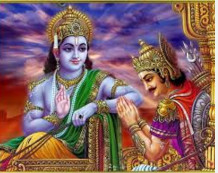
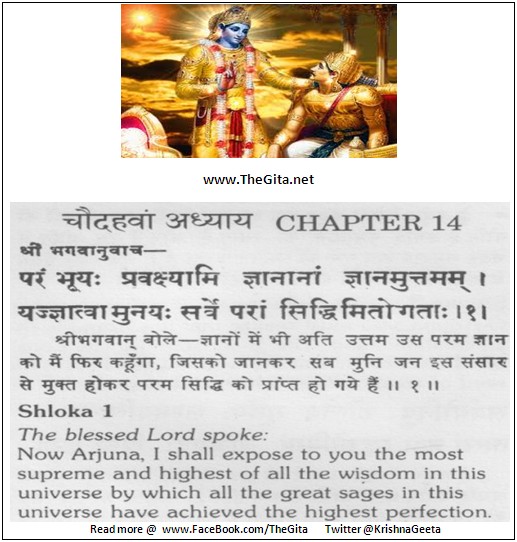
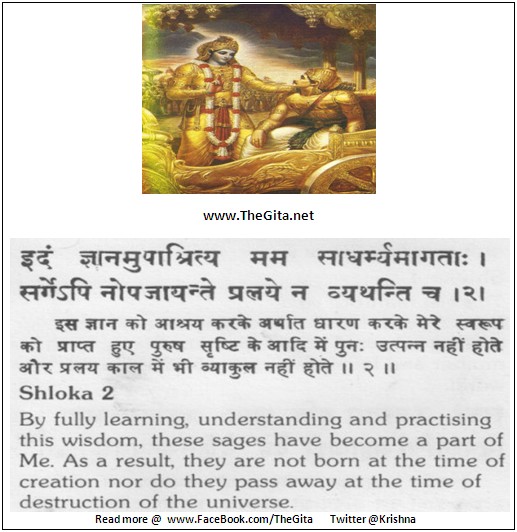
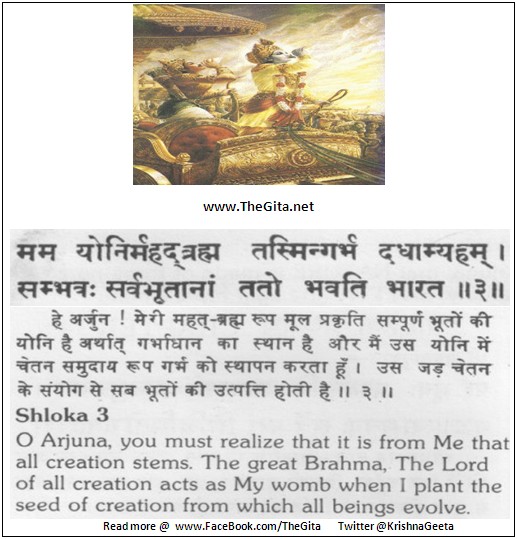
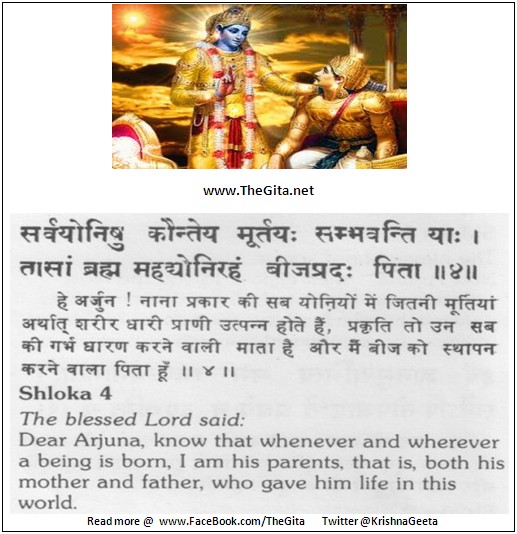
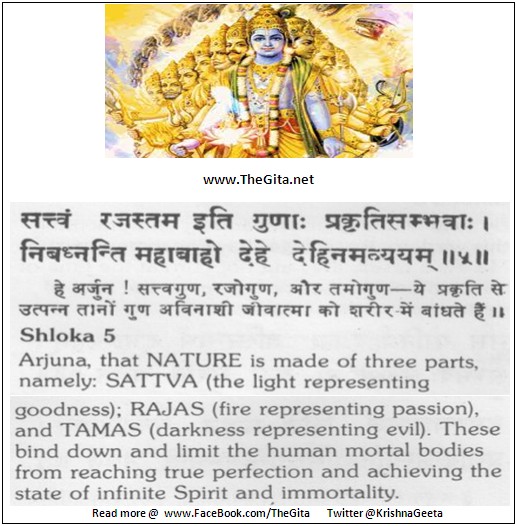
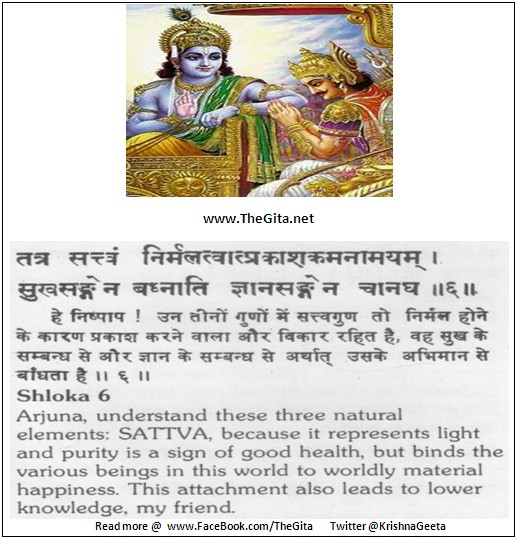
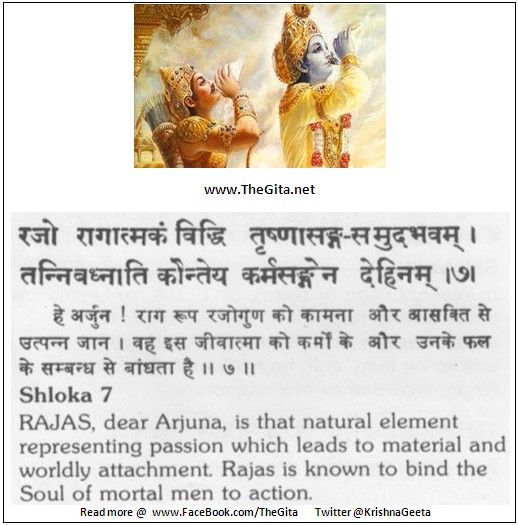
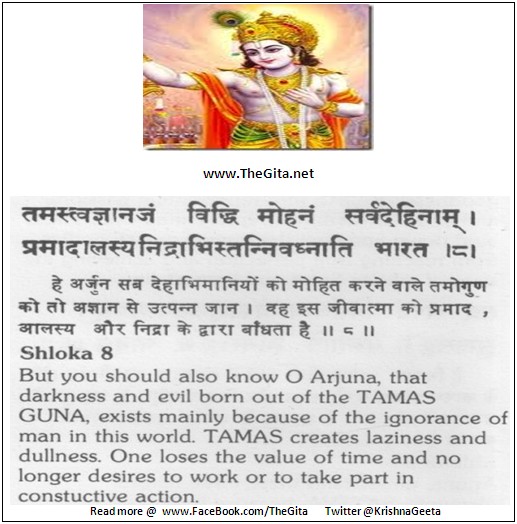
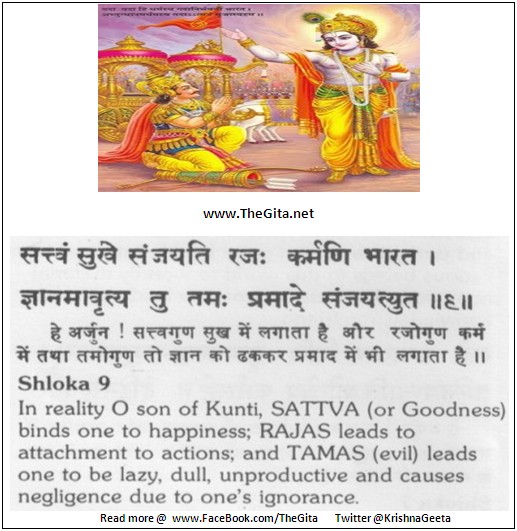
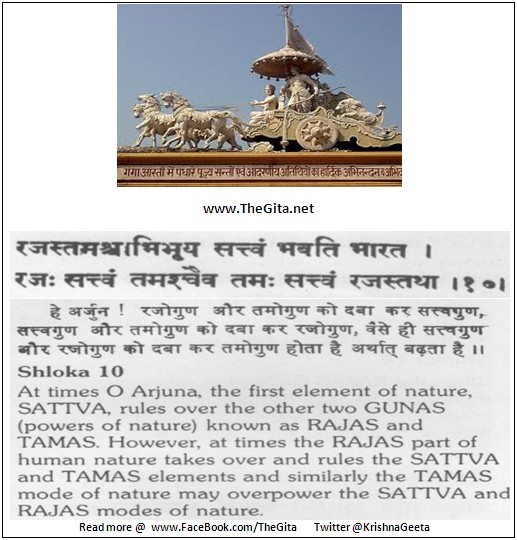
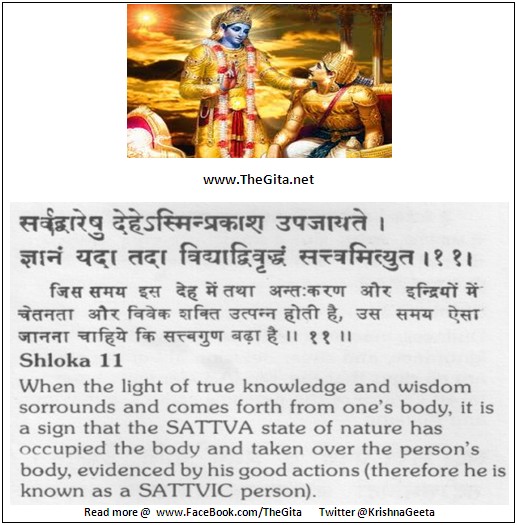
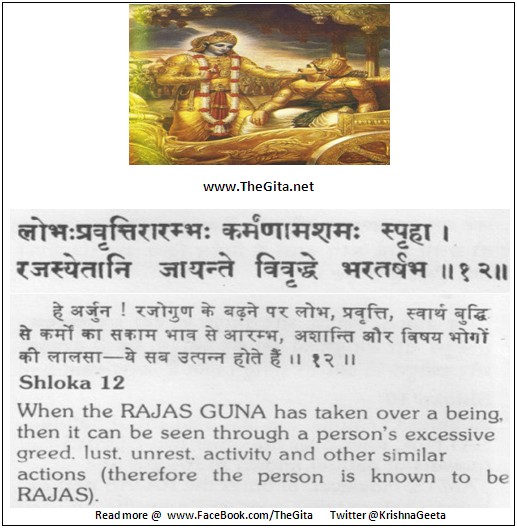
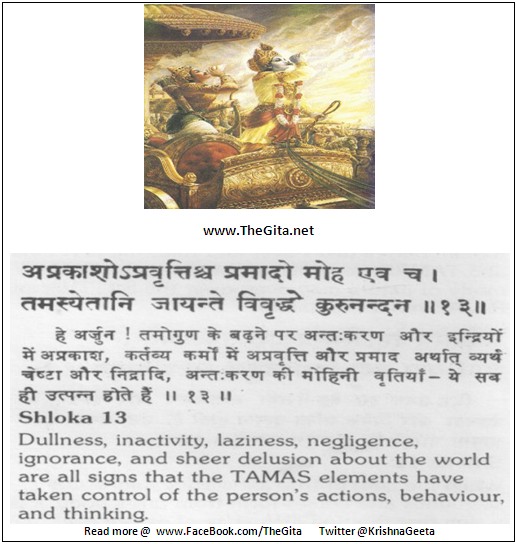
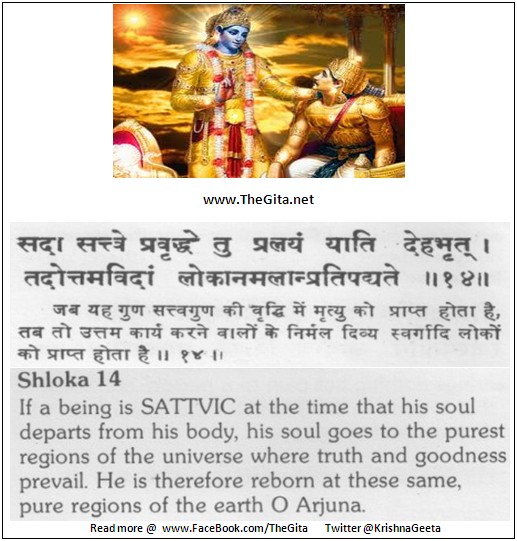
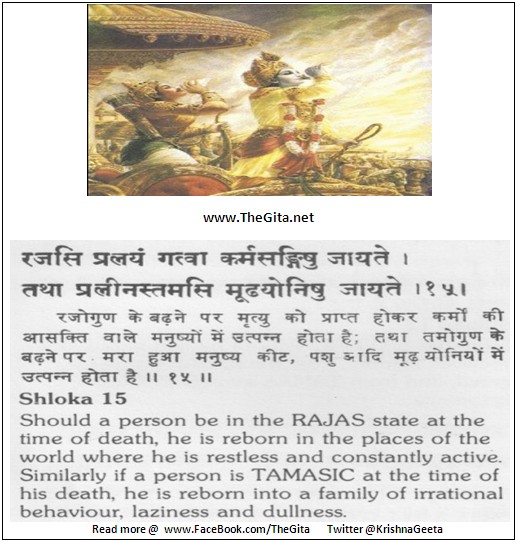
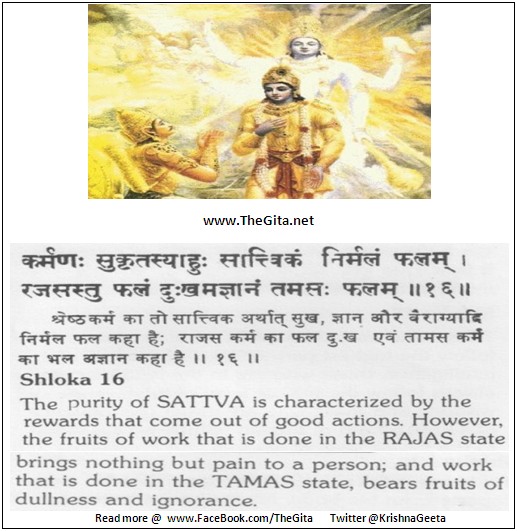
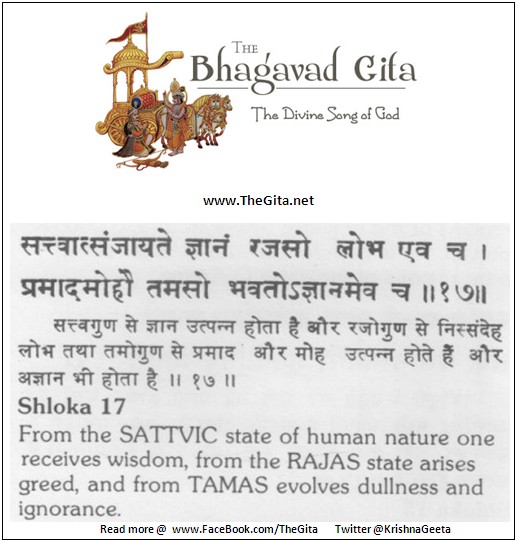
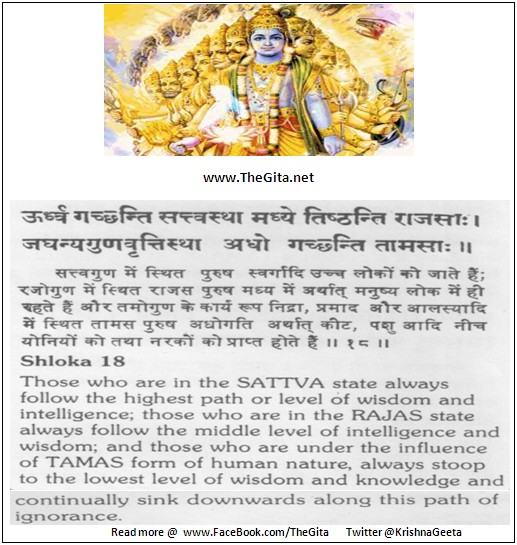
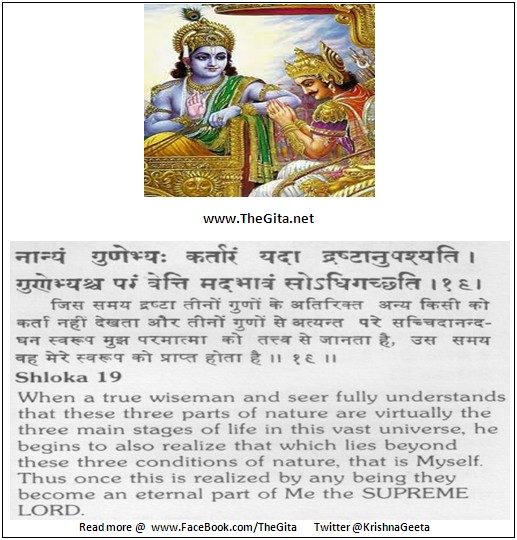
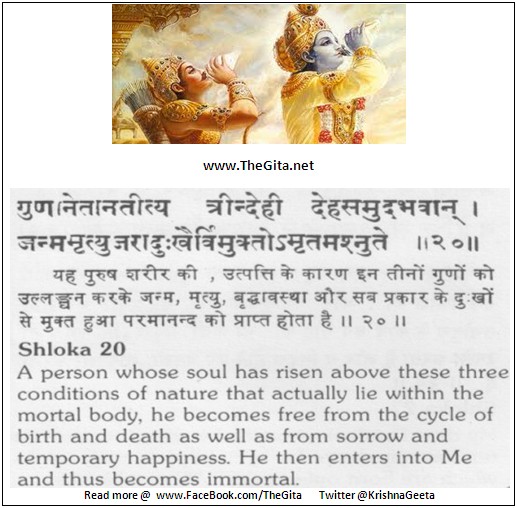
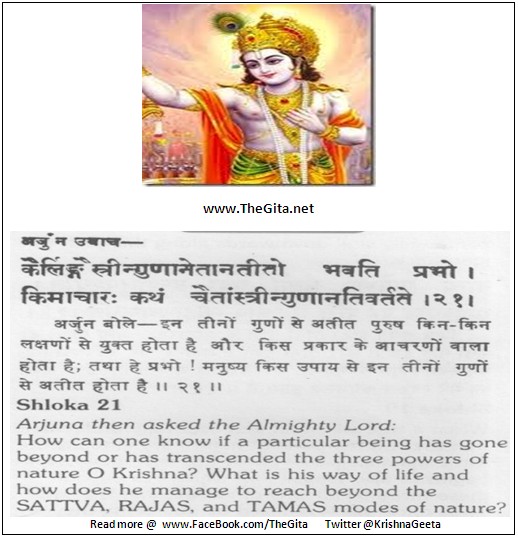
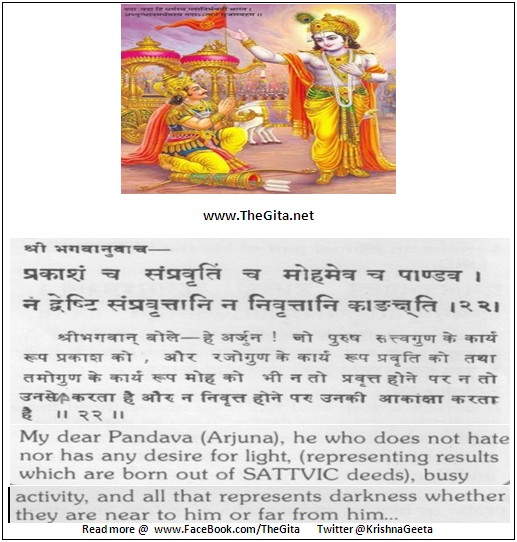
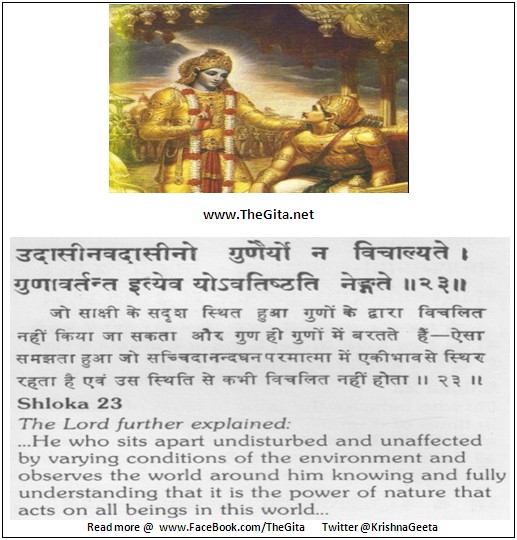
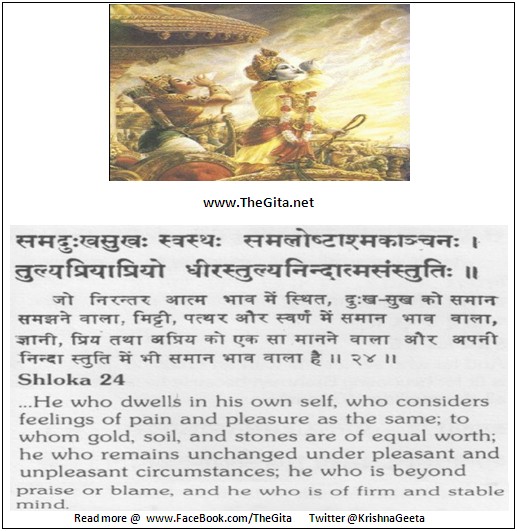
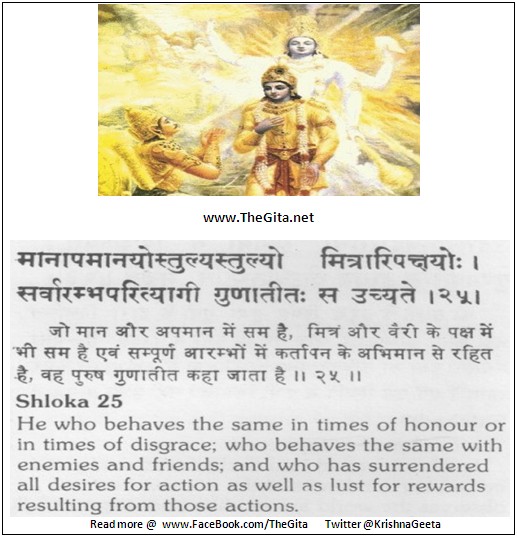
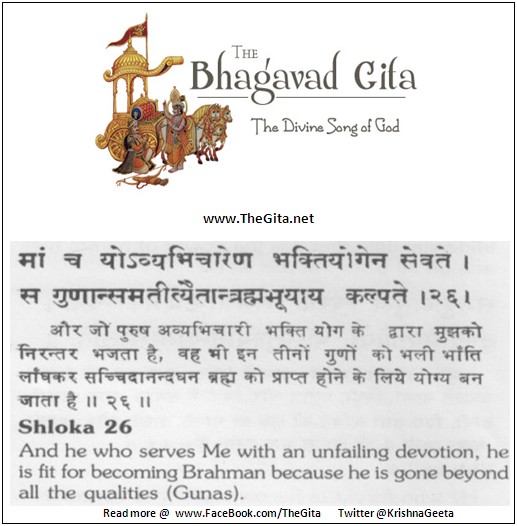
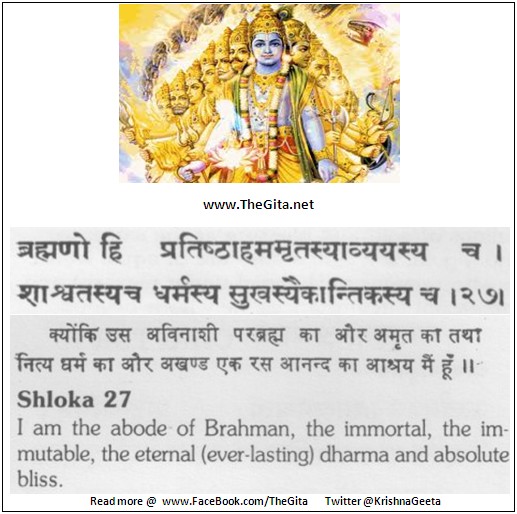
Pingback: Chapter – 7 | The Gita - Shree Krishna Bhagwad Geeta
Pingback: Chapter – 8 | The Gita - Shree Krishna Bhagwad Geeta
Pingback: Chapter – 15 | The Gita - Shree Krishna Bhagwad Geeta
Pingback: Chapter – 5 | The Gita - Shree Krishna Bhagwad Geeta
Pingback: Chapter – 18 | The Gita - Shree Krishna Bhagwad Geeta